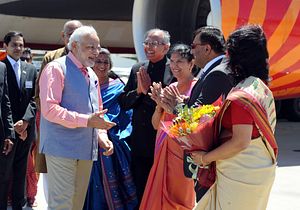Over the past two decades, state governments in India have increased their engagement with the outside world. This outreach has increased in recent years – especially the last two — as a consequence of the current Modi government laying a strong emphasis on subnational diplomacy.
There are several key reasons why states are emerging as important stakeholders in foreign policy. First, the economic reforms of 1991 created space for states seeking foreign direct investment. Second, a number of regional leaders, eager to burnish their credentials, have sought to showcase their states by having roadshows abroad and, in recent years, organizing investors’ summits at home. Third, the diaspora from a number of states has also played an important role in strengthening linkages between the states they hail from and countries they have migrated to. Finally, Prime Minister Narendra Modi, having been a chief minister of a state, encourages greater participation in diplomacy by subnational units.
One country with which there is immense potential for building state-to-state links is Australia.
India and Australia share much in common. Both celebrate their respective national days — Australia Day and Indian Republic Day — on January 26. Both countries are liberal democracies, with federal systems of government. Their strategic and economic interests have converged on numerous fronts, resulting in stronger ties between New Delhi and Canberra.
Despite these closer ties, negotiations on the India-Australia Comprehensive Economic Cooperation Agreement seem to have hit a roadblock. However, there is a strong trend in favor of subnational diplomacy, which hopes to boost trade and investment linkages in an alternative way.
India-Australia trade, currently at US$13.6 billion, has witnessed an increase, but is way below its potential. After all, Australia is home to a strong Indian diaspora and a significant Indian student population. Both groups hail from Indian states like Andhra Pradesh, Punjab, and Gujarat — indeed, Punjabi is the fastest growing language in Australia!
To capitalize on the potential for Australia-India relations, numerous Australian and Indian states have entered into formal arrangements to promote stronger ties between provinces.
In 2012, the premier of New South Wales signed an MOU with Maharashtra’s chief minister to recognize and expand the cultural, economic, and people-to-people relationships between the two states. The MOU aims to build trade and investment in a number of areas including: financial services, energy, urban infrastructure, public health, bio tech, IT, education, film, arts, culture, and sport. Each of these focus areas are strengths of the respective states. Indeed, the trade and investment flows in a number of these areas have grown since the signing of this MOU, driven in part by an increasing interest in financial services and infrastructure.
Three years later, in 2015, the premier of New South Wales signed an MOU with the chief minister of Gujarat. The MOU focuses on exchanges in education, skills development, water security, clean technology and smart city and infrastructure development.
New South Wales, which is home to some of Australia’s top universities and skills development organizations, is looking to create opportunities for two-way exchange programs for students from both states. It is hoped that this promotion of institutional and people-to-people linkages will lead to a more meaningful and sustainable state-to-state relationship.
Meanwhile, South Australia and Rajasthan also signed a “sister state” agreement in 2015. The agreement intends to boost the two-way exchange of research, policy, and technical capabilities. South Australia hopes to share its significant expertise and experience in water management, facilitating access to quality water to communities in Rajasthan. The South Australian Minister for Investment and Trade, Martin Hamilton-Smith, called the agreement “an opportunity to show South Australia’s support for Rajasthan and the relationship we intend to build with government and industry.”
In 2016, the Western Australian treasurer and citizenship and multicultural interests Minister and Andhra Pradesh’s chief minister signed an agreement to establish a sister state relationship. As both states share a wealth of mineral resources and agricultural land, it is hoped that these sectors may be further developed through the agreement. The focus is on mining and mining services, agriculture and fisheries, energy production and distribution, and higher and vocational education and training.
While Victoria boasts one of the strongest relationships with India through two-way trade and investment flows, it does not have an official sister state relationship with any Indian state. However, encouraged by the Victorian government’s strong links in India, Victorian organizations such as the Victorian Chamber of Commerce and Industry have developed links with their counterparts in Indian states to promote stronger state-to-state ties.
Other Australian states have encouraged their businesses to enter into consortiums and work with Indian state governments in a particular field. For instance, in 2016, five public and private vocational education providers from Queensland formed a consortium and entered into an agreement with the government of Kerala to deliver skills and training in the state.
While there are still only a few formal state-to-state linkages between Australia and India, there is clearly an increasing trend favoring subnational diplomacy. This is perhaps unsurprising, especially given the presence of a strong diaspora and student population in Australia with strong links to their Indian home states.
Shaun Star (@shaunjstar) is the Executive Director of the Centre for India Australia Studies, Assistant Dean and Assistant Professor at Jindal Global Law School, O.P. Jindal Global University and Chair of the Australia India Youth Dialogue.
Tridivesh Singh Maini (@tridiveshsingh) is Assistant Professor with The Jindal School of International Affairs, O.P. Jindal Global University.

































